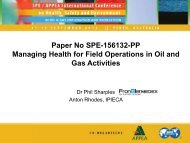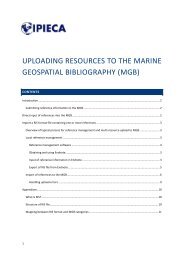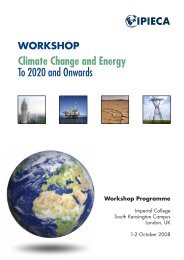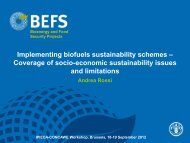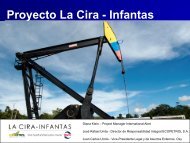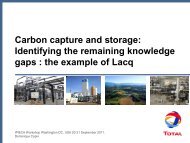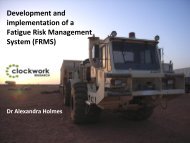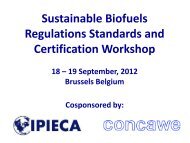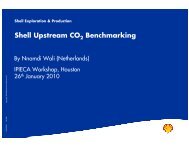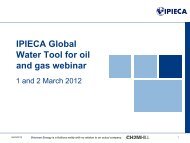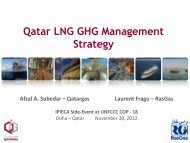WSSD Report FINAL! - OGP
WSSD Report FINAL! - OGP
WSSD Report FINAL! - OGP
Create successful ePaper yourself
Turn your PDF publications into a flip-book with our unique Google optimized e-Paper software.
CONTRIBUTING TO SUSTAINABLE DEVELOPMENT<br />
Ethics and human rights<br />
Ethics and human rights<br />
Background<br />
The Universal Declaration for Human Rights<br />
(UDHR) was developed more than 50 years ago.<br />
The far-reaching United States Foreign Corrupt<br />
Practices Act (FCPA) was enacted a generation ago.<br />
Important as they are, these milestones have still<br />
not removed the barriers to investment that<br />
exist for many companies. Concerns over<br />
corruption, human rights and labour issues still<br />
inhibit a number of international corporations—including<br />
those in the oil and gas<br />
industry—from making foreign investments.<br />
Arguments about cultural differences or lack of<br />
business sophistication in some developing<br />
nations cannot explain away these obstacles. In<br />
its Global Values Survey, which represented 40<br />
countries and 50 different faith communities,<br />
the Institute for Global Ethics found the five<br />
most important values to be truth, compassion,<br />
responsibility, freedom and reverence for life.<br />
Industry response<br />
No matter where we operate, the oil and gas<br />
industry aims to apply these universal values by<br />
following ethical business practices; by combating<br />
corruption and enforcing ethical trading<br />
policies; by treating all people equitably through<br />
non-discriminatory employment practice and<br />
provision of a living wage; by respecting indigenous<br />
people and local communities and<br />
involving them in decisions that may effect<br />
them; and by working to ensure a fair sharing of<br />
economic benefits.<br />
Some companies in our industry have taken a<br />
sense of direction in ethics and human rights<br />
from the Global Compact, an initiative of the<br />
United Nations Secretary General Kofi Annan.<br />
The Global Compact calls for a closer and<br />
mutually supportive partnership between the<br />
UN and the private sector and puts a more<br />
human face on globalization. It encourages good<br />
practices based on nine universal principles<br />
covering human rights, labour and the environment.<br />
Endorsing companies develop and<br />
implement community projects that demonstrate<br />
their best practices and support of the Global<br />
Compact principles. Many other companies that<br />
have not formally endorsed the Global Compact<br />
have nevertheless incorporated many of its principles<br />
within their own corporate policies and<br />
standards. Other companies have endorsed the<br />
Sullivan Principles, which also contain principles<br />
addressing a range of social responsibility issues.<br />
Ethical trading is another relevant issue, centring<br />
as it does around commodity/raw goods in<br />
which market prices often undergo severe and<br />
rapid fluctuations. This has an impact on both<br />
employees and communities. Ethical trading<br />
draws on core International Labour Organization<br />
(ILO) conventions that include freedom of association,<br />
decent wages, adequate living conditions,<br />
worker representation, security and minimum<br />
health and safety standards.<br />
In remote areas, the rights of indigenous peoples<br />
play an important part in our operations. Our<br />
commercial successes must be sustained in ways<br />
that demonstrate respect for the indigenous<br />
peoples who, after all, were there first. In the<br />
A constructive approach to addressing corruption<br />
An area of particular concern to our industry is the<br />
fight against corruption, as 80 per cent of the world’s<br />
oil and gas reserves are in countries found at the<br />
bottom of Transparency International’s Corruption<br />
Perceptions Index. To help in that fight <strong>OGP</strong> has set<br />
up an Anti-Corruption Task Force to explore issues<br />
and discuss case studies on topics that include<br />
education and training, standards and codes, due<br />
diligence, verification, joint work with other<br />
organizations, communications and advocacy.<br />
31



